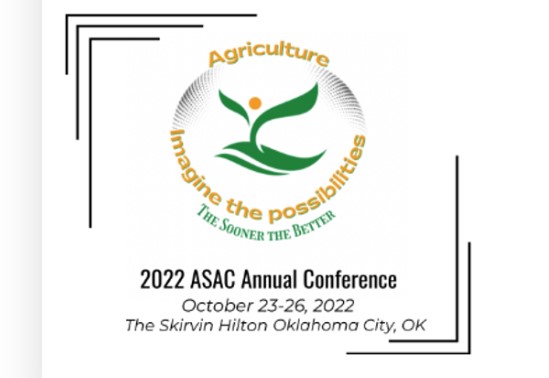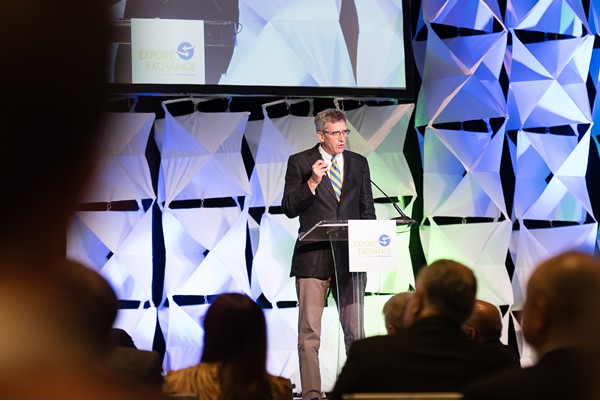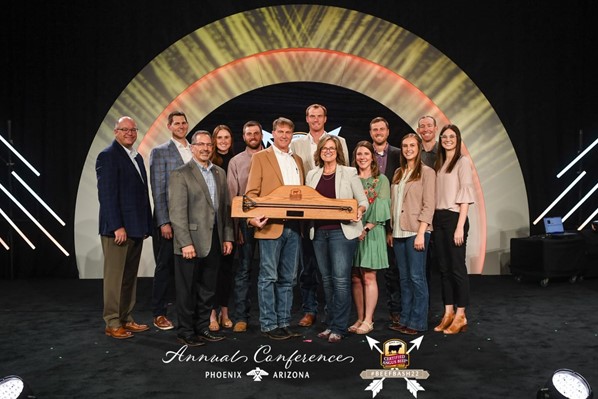Fri, 14 Oct 2022 10:25:50 CDT
There is a new blog post out at the Southern Plains Perspective, by Clay Pope. Read Below!
“Fire danger will be elevated at times this week, and not just because of the deepening drought. Dry and …

Oct 14
Fri, 14 Oct 2022 10:25:50 CDT
There is a new blog post out at the Southern Plains Perspective, by Clay Pope. Read Below!
“Fire danger will be elevated at times this week, and not just because of the deepening drought. Dry and …
Oct 14
Fri, 14 Oct 2022 09:35:53 CDT
Chances for Rain look better across the state for this weekend according to State Climatologist Gary McManus, “Models have certainly given us some hope for a good 1″ of rain across a good portion of the state, and a bit less (or more) here and there, associated with this cold front coming to the state Saturday. Should rain through parts of Sunday.”
The Rain is bringing a cold front with it where we could see widespread lows in the 30’s and the possibility of a freeze across some portions of the state which would be and early first fall freeze for even Northern Oklahoma.
McManus says fire danger will continue across the state, especially across the historically dry Northeast Oklahoma Area, but hopefully some timely rains will help with that.
Oct 14
Fri, 14 Oct 2022 08:53:50 CDT
The “butter board” food craze that has become a viral sensation is rooted in dairy checkoff strategy.
Dairy Management Inc. (DMI) assembled a “Dairy Dream Team” consisting of che…
Oct 14
Fri, 14 Oct 2022 08:51:37 CDT
A Red Flag Warning is in effect today from Noon through 8:00 PM across northeastern and parts of eastern Oklahoma. Another warm and dry day across Oklahoma with west-southwest winds increasing into the after…
Oct 14
Fri, 14 Oct 2022 08:47:24 CDT

The 2022 Annual Conference and Meeting of the American Society of Agricultural Consultants (ASAC) will be held Sunday, October 23 – Tuesday, October 25 in Oklahoma City at the Skirvin Hilton Hotel.
An engaging lineup of speakers is scheduled to present on a variety of topics pertinent to the challenging environment in which agricultural professionals live and operate their businesses.
Session topics include:
? You Cannot NOT Communicate, Ron Rabou
? Best Practices for Today’s Ag Consultant, Keith Dickinson
? Diversity and Inclusion, Rodney Patterson
? Technology in Ag Consulting, Hylon Kaufmann
? Accounting, Taxes and Business Planning, Paul Neiffer
? Macroeconomics: Finance and the Federal Reserve, Harold Black
? Discussion of the Center?s Mission and Focus on Various Regulatory Issues
National Ag Law Center at the University of Arkansas, Rusty Rumley
? Regenerative Agriculture ? Noble Research Institute, Dr. Hugh Aljoe
The Annual Banquet on Monday evening features our keynote speaker, Brittany Krehbiel-Hukill, a fifth-generation farmer from Hydro, Oklahoma, who is among the vanguard of an emerging generation of young leaders in state, regional and national agriculture. Tuesday afternoon includes a tour of the USDA-ARS National Grazinglands Research Laboratory, located west of Oklahoma City. We plan to visit Oklahoma National Stockyards on our return from the USDA station. Stockyard City is the home of the largest stocker/feeder cattle market in the world. Since its inception, more than 102,000,000 head of livestock have passed through the iron gates leading to the Stockyards operation. Cattle auctions are held Monday and Tuesday each week. There will be an opportunity to enjoy a great steak dinner at the Cattlemen’s Steakhouse.
Come to Oklahoma City and “Imagine the Possibilities – The Sooner, the Better”!
Register for the conference on the ASAC website: www.agconsultants.org/2022_annual_conference.php
About the American Society of Agricultural Consultants (ASAC)
The American Society of Agriculture Consultants (ASAC) is a non-profit organization whose members represent a diverse range of disciplines in the agriculture industry. ASAC’s membership is comprised primarily of experienced consultants boasting a wide array of expertise. Their business models range from sole proprietorships to leadership roles in larger, multi-consultant organizations, which cover a wide geographical area. To learn more about how ASAC can help you grow your agricultural consulting business, go to www.agconsultants.org.
Oct 14
Fri, 14 Oct 2022 08:38:01 CDT
Rail labor negotiations hit a speed bump Monday when it was announced the Brotherhood of Maintenance of Way Employees Division (BMWED), a division of the International Brotherhood of Teamsters and the third-…
Oct 14
Fri, 14 Oct 2022 08:27:37 CDT

A global audience of approximately 500 buyers and suppliers of U.S. coarse grains and co-products kicked off a full day of learning and networking at the Export Exchange 2022 in Minneapolis, sponsored by the U.S. Grains Council (USGC), Growth Energy and the Renewable Fuels Association (RFA). Among the top speakers on Thursday were Minnesota Ag Commissioner Thom Petersen and USDA Acting Deputy Under Secretary for Trade and Foreign Ag Relations Jason Hafemeister.
In his presentation, Petersen spoke of the importance of global trade at the state level, noting how Minnesota established an office in Taiwan that recently helped secure the sale of $2.7 billion in corn and soy products to that country. “We’ve built some great relationships, we had some delegations here over the past few weeks, Peru, Colombia, the Philippines,” he said. “I think that’s really opened up doors and I can see the value of these discussions around trade.”
Hafemeister spoke of the importance of global trade for reducing overall extreme poverty, how innovations have increased crop yields, and how the global trade map has shifted over the last several decades.
“If we don’t have open markets, we won’t have the investment needed to do the research and solve new problems,” Hafemeister said. “If the markets aren’t open, our farmers can’t adopt new ideas to sell into those markets. We can’t discriminate against techniques that stifle development and shut out producers.”
“We are pleased that both speakers set the tone for this exciting meeting,” said USGC President and CEO Ryan LeGrand. “They provided not only a localized perspective on the ag sector here in Minnesota, but also provided the larger national view of the U.S. and global grains market.”
“This week has been an exciting opportunity to network and build relationships that will last into the future,” said Growth Energy Senior Vice President of Market Development Mike Lorenz. “The content in the presentations has been very informative and relevant given all the trade challenges we are facing in today’s market from supply issues to logistics.”
“It was great to see this event kick off with so much enthusiasm,” said RFA Vice President for Technical and Regulatory Affairs Kelly Davis. “It has been four years since the last event, but the high level of interest in Export Exchange for networking and connecting across markets continues as if there was no gap. Today’s presentations helped everyone understand the global dynamics at play during this period of abnormal inflation and continuing post-pandemic logistics challenges.”
Also on the agenda Thursday was:
• a WASDE report overview by Reece Cannady of the USGC,
• a review of inflation, monetary policy and commodities by Arlan Suderman of StoneX,
• a shipping and logistics overview by Jay O’Neil of HJ O’Neil Commodity Consulting,
• a DDGS Global production, supply and demand briefing by Matt Fitzthum of CHS,
• a pet food outlook from Lisa Schole of Evolve Consulting; and
• a look at aquafeed demand by USGC’s Ronnie Tan.
Taking place biannually, Export Exchange offers attendees an unparalleled opportunity to meet and build relationships with domestic suppliers of corn, distiller’s dried grains with solubles (DDGS), sorghum, barley and other commodities. The global buyers have been broken down into 20 trade teams that have either been in the United States ahead of Export Exchange or will continue their visits after the event to see corn-growing states during harvest, explore DDGS production at ethanol plants, view port facilities and more as they build their networks with U.S. suppliers.
The conference runs through Friday at the Hilton Minneapolis. More information is available at www.exportexchange.org or on social media at #ExEx22.
Oct 14
Fri, 14 Oct 2022 08:21:35 CDT
The U.S. Department of Agriculture’s (USDA) Food Safety and Inspection Service (FSIS) today released a proposed regulatory framework for a new strategy to control Salmonella contamination in poultry pr…
Oct 14
Fri, 14 Oct 2022 08:14:11 CDT
Senior Farm and Ranch Broadcaster, Ron Hays, is back visiting with CattleFax CEO, Randy Blach, talking more about the current cattle market conditions and the influence of drought.
Blach said factors in …
Oct 14
Fri, 14 Oct 2022 08:10:43 CDT

Progress. For many, the word is one that often feels intangible, hard to grasp or clearly define.
“Progress means that we are measuring improvement, coming up with a benchmark and knowing where we are today and where we want to go,” says Debbie Lyons-Blythe. “Not always making change, but always moving forward.”
Adapting Angus cattle to perform better, in tandem with the land, and create a better end product is a labor of love 33 years in the making for the Blythe family. Every year they’ve improved one breeding decision, management change, farm tour and conversation at a time.
“Cattle producers and consumers are all vitally important to the progress of our environment, animal welfare and making sure our businesses are profitable,” Debbie says.
Working toward a better beef business for themselves and the industry earned Blythe Family Farms the 2022 Certified Angus Beef (CAB) Progressive Partner Award. They accepted the award at the brand’s Annual Conference in Phoenix on Sept. 30.
Succession plans aren’t traditional dinner table conversation for most parents and their 20-something years-old children and spouses. But it’s a frequent topic at Blythe Sunday dinners.
Duane and Debbie may have many more able years ahead, but they’re already transitioning the farm to their five children.
“Working together, we’ve helped them and created an opportunity for them to learn the best practices from us,” Duane shares. “They’re going to find ways to build a better fence down the road, but they’re not going to make the same mistakes I made.”
The transition kit includes digital photos of pastures, plants and notes on weather and dates. Debbie says it’s easy to reference management when questions arise on when to move cattle or burn a pasture.
This record-keeping practice and forward-thinking model helps find ways to make the farm better.
“Progress is difficult to define without the ability to compare to a baseline,” Debbie says. “We have to be able to utilize this land in such a way that it will raise more food. We have to follow best-management practices and make sure we are doing a better job with what we have.”
Doing so led to 175 registered Angus cows, 225 commercial females and a 375-head heifer development program.
With the rich native grass resource, they decided 17 years ago their time, skills and resources would be best spent in a commercial heifer program.
“We typically purchase heifers from families with cattle that have genetics we know,” Debbie says. “I prefer weaned and preconditioned with two shots and bunk broke, but we’re willing to do the work. The longer we own them, the better those heifers settle to AI.”
After artificially inseminating (AI) once to a proven sire, heifers go to native grass with Blythe Angus bulls for 60 days for a tight calving interval starting February 1. Debbie uses an EPD (expected progeny difference) benchmarking system created to find ideal matings. Birth weight, weaning weight and marbling are priorities.
“We rely heavily on genomics when we’re selecting bulls,” she explains. “I believe strongly in carcass EPDs, especially marbling. If the hot new bull doesn’t have a good marbling score, I won’t use him. I just feel like it’s my responsibility to be able to create good beef.”
Bull customers rely on her decisions, too.
Many have commercial herds and retain ownership of their calves, but they leave the EPDs to Debbie. Making sure they meet both cattle customer and beef consumer demands, the Blythes often retain ownership on their calves at Tiffany Cattle Company.
A pen sold in 2021 graded 97% Choice or Prime, with 90% making CAB or Prime. Just more data pointing to progress, if not quite perfection.
The connection to the plate doesn’t stop there. The Blythes are constantly building bridges for people who want to know who raised their food. The modern cattle business is only sustainable with demand for high-quality beef raised on productive land and food influencers and customers who understand that.
Many food bloggers, chefs, foodservice salespeople and retailers have had their first ranch experience at Blythe Family Farms. Whether it’s opening the gate or giving time to industry endeavors, the beef industry can often count on the Blythe’s to share their time, talents and treasures. Most recently, Debbie was elected Chairman of the U.S. Roundtable for Sustainable Beef (USRSB).
“Sustainability is taking care of the land, animals, people and making money,” she says. “My involvement in the USRSB is part of what will make it possible for my kids to continue to farm and ranch.”
Progress with tools, data, continuing education and a willingness to have the hard conversations over the dinner table or in the board room make their legacy a defining one that will only get better with time.